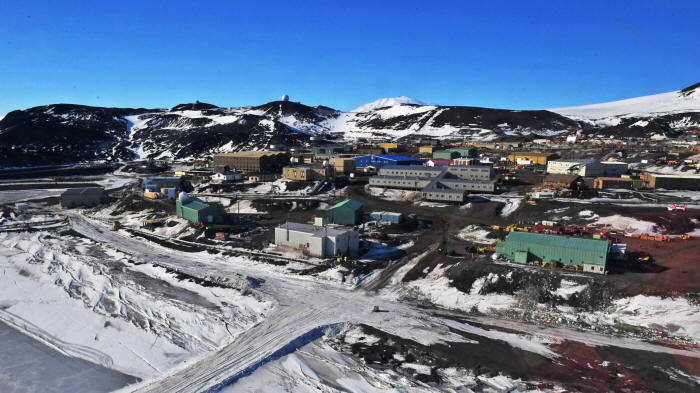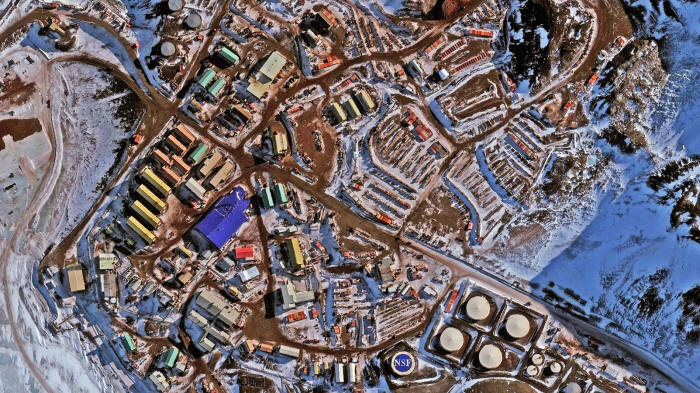|
US McMurdo Station in Antarctica on November 11, 2016.
(Image credit:
MARK RALSTON/AFP via Getty Images) confined environment similar to those that might be on future Moon or Mars bases...
Antarctica is a common analog for spaceflight or stay on a "future" Moon base or Mars settlement due to its remote nature.
NSF pledged to work with its own participants, as well as to share information with other organizations working in remote environments, for assessment, prevention and follow-up.
Video also HERE...
In a report in Nature, a scientist and past participant in NSF polar work said the survey is "an important step" towards addressing issues with harassment.
Nature's report added that NSF (like NASA) has been threatened with large budget cuts by the White House, and the entire government is also being targeted by the Trump administration for matters relating to diversity, equity and inclusion.
These two factors, the Nature report added, make it unclear to what capacity NSF can respond to the findings.
The NSF spokesperson told Space.com, however, that the foundation pledged to use the survey results "as a way to ensure continuous program improvement based on lived experiences," particularly because of the quality of the data collection.
Antarctica is an example of an isolated, confined environment - just like a spacecraft or a potential future base on the moon or Mars.
A term for such locations, Isolated, Confined, and Extreme environments (ICE - read 'Psychosocial Issues in Isolated and Confined extreme Environments'), simply put, includes zones where humans must work in an operational (and often dangerous) environment far from the usual supports of home.
The teams that will work best in ICE should be properly screened and selected to deal with,
The study was co-authored by the University of Southern California's Lawrence Palinkas and the University of British Columbia's Peter Suedfeld, who are frequently cited among both ICE researchers and space scientists.
Generally speaking,
For example:
Astronauts in space speak with a psychologist at least once every two weeks, according to the Canadian Space Agency.
Long-duration astronauts in particular are given rest days to pursue hobbies, call family or friends, and generally to relax.
Satellite imagery of McMurdo Station in Antarctica. (Image credit: DigitalGlobe via Getty Images)
Antarctic scrutiny
Regarding Antarctica, USAP has been under recent scrutiny by the House Committee on Science, Space, and Technology.
The committee started an investigation after a 2022 report by NSF and partners, concerning sexual assault and harassment during NSF activities in Antarctica.
The House committee found "serious deficiencies" in 2024 with how NSF was managing USAP, and made recommendations for remedies.
The new NSF survey, done alongside several external partners, canvassed 2,760 individuals who deployed with the NSF Office of Polar Programs between 2022 and 2024.
Roughly 25% of those canvassed, or 679 people, completed the survey. Participants, however, were asked to complete different inventories that had their own response rates.
For example, 521 individuals completed a "victimization inventory", in which 40.7% of respondents said they had experienced at least one instance of sexual assault or sexual harassment.
Among the victimization respondents, the survey found that more than half of those affected by these incidents (59%) were female.
Responses were nearly evenly split (48% and 52%) between those deployed less than a year, and those deployed for between one and four years.
A "bystander inventory" generated 572 responses, in which nearly 70% (68.7%) of respondents said they had witnessed an incident of sexual assault or sexual harassment.
Nearly half (44.5%) said the most recent incident they witnessed was part of a series of issues.
(Broadly speaking, assault or harassment was classified into four categories by NSF: as "sexual harassment and stalking", "unwanted sexual attention", "sexual coercion, and "sexual assault.")
NSF emphasized to Space.com that the Antarctic survey was not meant to be representative,
Recommendations of the Antarctic survey, in NSF's words, include:
The foundation has already implemented some of the report recommendations, including case tracking of incidents and better bystander intervention training.
More details are available in a memorandum about the report.
For example, NSF said the program office is ready to assist those participants who experienced sexual assaults, and has a dedicated web page available for reporting and other needs.
|



